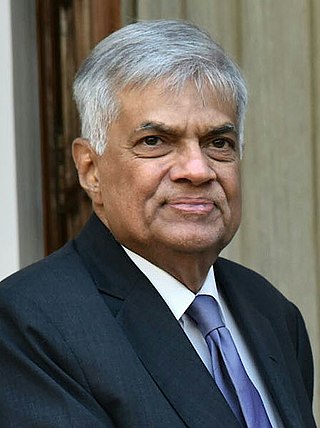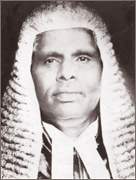In most common law jurisdictions, the attorney general or attorney-general is the main legal advisor to the government. In some jurisdictions, attorneys general also have executive responsibility for law enforcement, prosecutions or even responsibility for legal affairs generally. In practice, the extent to which the attorney general personally provides legal advice to the government varies between jurisdictions, and even between individual office-holders within the same jurisdiction, often depending on the level and nature of the office-holder's prior legal experience.

The Parliament of the Democratic Socialist Republic of Sri Lanka is the supreme legislative body of Sri Lanka. It alone possesses legislative supremacy and thereby ultimate power over all other political bodies in the island. It is modeled after the British Parliament.

The State Council of Ceylon was the unicameral legislature for Ceylon, established in 1931 by the Donoughmore Constitution. The State Council gave universal adult franchise to the people of the colony for the first time. It replaced the Legislative Council of Ceylon, the colony's original legislative body.

Sir Oliver Ernest Goonetilleke was a Sri Lankan statesman. Having served as an important figure in the gradual independence of Ceylon from Britain, he became the third Governor-General of Ceylon (1954–1962). He was the first Ceylonese individual to hold the vice-regal post.
The Ceylon Civil Service, popularly known by its acronym CCS, was the premier civil service of the Government of Ceylon under British colonial rule and in the immediate post-independence period. Established in 1833, it functioned as part of the executive administration of the country to various degrees until Ceylon gained self-rule in 1948. Until it was abolished on 1 May 1963 it functioned as the permanent bureaucracy or secretariat of Crown employees that assisted the Government of Ceylon.

Major Edward "Eddie" Alexander Nugawela, ED was a Ceylonese lawyer, soldier and politician. He was the first Cabinet Minister of Education in independent Sri Lanka (1947–1954), later Cabinet Minister of Health (1954–1956), a Member of Parliament and State Council.
Sydney Godfrey de Zoysa was a Sri Lankan senior police officer. A former Deputy Inspector General of Police (DIG) of Range II and Permanent Secretary to the Ministry of Internal Security, he was one of co-conspirators of the attempted military coup of 1962.
The Ministry of Justice, Prisons Affairs and Constitutional Reforms is the cabinet ministry of the Government of Sri Lanka responsible for the implementation of policies, plans and programmes for the administration of the country's justice system, and thereby administers its courts and prisons. Wijeyadasa Rajapakshe is the incumbent Minister of Justice as of 20 May 2022.
The Executive Council of Ceylon was the executive council created in Ceylon by the British colonial administration on the recommendations of the Colebrooke-Cameron Commission along with the Legislative Council of Ceylon in March 1833.
The Ministry of Finance, Economic Stabilization and National Policies is a cabinet ministry of the Government of Sri Lanka responsible for developing and executing the government's public finance policy, economic policy and long term fiscal planning. The Treasury is housed at the General Treasury Building in Fort.

The Minister of Finance is an appointment in the Cabinet of Sri Lanka. The post was created in 1947 when Ceylon gained independence as Sri Lanka.

The Prime Minister of the Democratic Socialist Republic of Sri Lanka is the head and most senior member of parliament in the cabinet of ministers. It is the second-most powerful position in Sri Lanka's executive branch behind the president, who is the constitutional chief executive. The Cabinet is collectively held accountable to parliament for their policies and actions.

Chellappah Nagalingam, KC was a leading Ceylonese judge and lawyer. He was a Judge of the Supreme Court of Ceylon and served as acting Governor-General of Ceylon in 1954. He also served as acting Chief Justice, acting Legal Secretary and Attorney General. He was the first Ceylon Tamil to be appointed to the bench of the Supreme Court of Ceylon. He is also considered the founder of Hindu College Colombo.
Sir John Harry Barclay Nihill, was a British lawyer and administrator who served throughout the British Empire.
Upali Batuwantudawe was a Ceylonese lawyer and politician.
The chief secretary of Ceylon, was the chairman and one of three officers of state of the Board of Ministers of the State Council of Ceylon from 1932 to 1947. The post succeeded that of Colonial Secretary which was one of six offices that held a seat in the Executive Council of Ceylon until 1932.
Sir Robert Harry Drayton, was a lawyer and a senior colonial civil servant who worked in Palestine, Tanganyika, Ceylon, Jamaica and Pakistan. He served as the Chief Secretary of Ceylon from 1942 to 1947 and as the Legal Secretary of Ceylon.
The Financial Secretary of Ceylon was an officer of the Ceylonese Government and member of the Board of Ministers. The Treasurer of Ceylon was one of six offices that held a seat in the Executive Council of Ceylon from 1809 to 1932. The post was replaced by the that of Financial Secretary in 1932, as one of three officers of state of the new Board of Ministers that replaced the Executive Council under recommendations of the Donoughmore Commission. The Financial Secretary was in turn replaced by the new office of the Minister of Finance in 1947 under the recommendations of the Soulbury Commission under the Ceylon Independence Act, 1947 and The Ceylon Orders in Council 1947.






